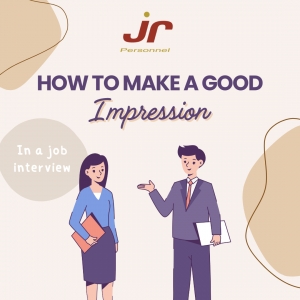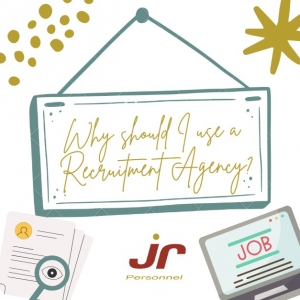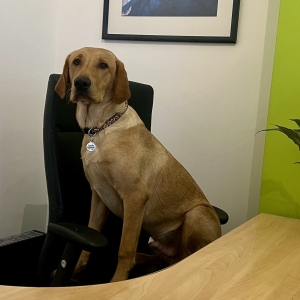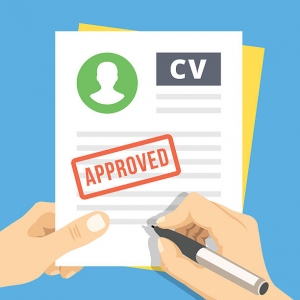Owner
Before your interview, make sure you set aside time to do the following:
Know the company
Make sure you do your research and go into your interview with a clear understanding of the job requirements.
The age-old question posed by most employers…
“Tell me about yourself and why are you interested in this role with our company?”.
The idea is to quickly communicate who you are and what value you will bring to the company and the role.
Practise
Practising your answers out loud is an effective way to prepare. Say them to yourself or a friend and run through your questions and answers. Ask your friend for feedback! You’ll find that you gain confidence the more you practise.
Prepare smart questions
Employers expect you to ask questions because they want to know that you’re thinking about what it would be like to work there and with them.
“Can you explain some of the day-to-day responsibilities for this job?”
“What departments does this team work with regularly? What does that process look like?”

First impressions
Dress accordingly - If you’re speaking to a recruiter before the interview, you can ask them about the dress code in the workplace and choose your outfit accordingly. If you don’t have someone to ask, research the company to learn what’s appropriate.
Don’t forget the little things - Shine your shoes, brush your teeth, make sure your nails are clean and tidy, and check your clothes for holes, stains, pet hair and loose threads.
Arrive 10–15 minutes early - Map out your route so you can be sure to arrive on time. Consider a backup plan if there are delays or road closures.
What to bring to the interview
Your CV - In case you are asked if there is anything you wanted to highlight in your experience or accomplishments
A pen and notebook - Take notes, but not on your phone or electronic device. Maintain eye contact as much as possible. Write information down so that you can refer to these details in case you are asked to come back for a second interview.
A written version of the prepared questions for your interviewers
A smart bag - Keep all of your documents in a single, multi-use messenger bag, folder or portfolio. Ensure it’s professional & appropriate.
Good manners & body language
Smile frequently. Make eye contact when you’re speaking. Sit or stand tall with your shoulders back.
Treat every single person you encounter with respect. This includes everyone you meet on the premises, security & front desk staff. Even if they aren’t the hiring manager, your potential employer might ask for their feedback.
The Handshake During most interviews, the hiring manager should initiate a handshake. Stand, look the person in the eye with a smile. A good handshake should be firm.
Respond truthfully to the questions you’re asked. Try to divert your answers back to your skills & accomplishments by using examples of results you’ve achieved.Keep your answers short and focused, making sure that you actually answer the question you’ve been asked. Your time with each interviewer is limited so be mindful of rambling. Let your interviewer lead the conversation.
Have you ever thought about using a Recruitment Agency to assist you in the process of finding a job?
Here's Why you should...
1 – It is a completely FREE service! Registering with us to help you find a job doesn’t cost a thing! There are no hidden fees for candidates at all. Recruitment Agencies are paid by the Clients we place you with!
2 – We are experts in our Field! JR Personnel specialise in Office recruitment, with many years of experience between our consultants we know just what our Clients are looking for and have great testimonials from our placements!
3 - Let us do the work, so you don’t have to! – We know how long it can take searching through jobs online, completing specific application forms and sending over CV’s tailored to that role. That’s where we come in, when we get a new available role that we think is right for you, we will be in touch to see if you would like to be put forward for it and get you an interview arranged!
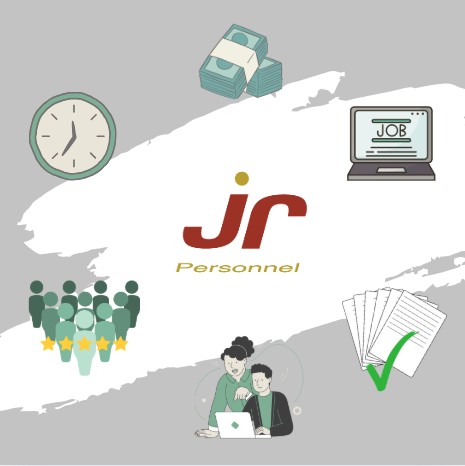
4 – Exclusive Candidates & Clients - Working with a recruitment agency means that clients will receive the best candidates, lots of companies prefer screening applicants through agencies rather than posting the vacancy online, giving you access to jobs that are never posted publicly. This means that when working with an agency, you’ll have the opportunity to access to more jobs and you won’t be competing with as many candidates.!
5 – A new support system! – We will be with you every step of the way, we meet all candidates face to face on a WhatsApp video call so we can really get to know you and understand exactly what it is you are looking for in your job search! This will include what working hours and salary requirements you have and what our current vacancies are that we feel you may be interested in. We will support you with your CV, give you interview tips and liaise with the clients on your behalf.
Looking for a change?
A fresh new start to the year?
It all starts here...
Every year on the 1st of January, we make resolutions and in turn the market is inundated with candidates looking for a new role, making it tough competition.
If this is you, seeking pastures new, we can help you with some simple steps to get ahead of the game!
1 - Understand why you want to make a change
Do you really know the reason(s) you want to leave your current role? Have you had the opportunity to discuss them with your manager and are they able to make changes for you? These are all things you need to establish before making the decision to move on. Once you are sure that a change of role and company is the right decision and you know why you will be able to think about what role, company and environment will best suit you moving forward.
2 - Role, Company, Environment
Make sure that you know in yourself, what you are looking to do, what kind of company you want to work for and what working environment you will be comfortable in. Having these in your mind will help tailor your search and ensure you are looking at positions for the right reasons. Research shows that the working environment, culture and team ethic of businesses are important to candidates looking for new roles and both the hiring employer. If you find a position with a culture and working environment that aligns with your own personal values, you are more likely to enjoy what you are doing and stay loyal to your employer.

3 - Stay Positive and Open Minded
Make sure you have a positive & flexible attitude when looking at different businesses and a range of locations. This will show you more opportunities, that in the long run may be worth changing location or industry for salary wise. Many candidates we work with find their dream roles within organisations that they had not considered when they started their search.
4 - Update your LinkedIn profile & Social Media
Having a LinkedIn profile is very important. It acts as a personal online representation and an online CV. The Majority of current employers will look you up using your Linkedin profile, having access to the information and CV that you have uploaded, to assess whether to progress with your application. Ensure that your Linkedin profile is up to date and if you want to, you can sign up to Job feeds, companies and groups. Also, make sure that your social media accounts are job search ready, if you have your socials set to 'public' you can be searched online. What an employer sees, could be the deciding factor as to whether or not they invite you for an interview. Check that your Facebook, Instagram and even your personal email address is work appropriate.
5 – Long term goals and achievements
Take a moment to analyse your career so far, what milestones and achievements have you made? This will help not only if you get asked in an interview but if you want to set yourself some personal career goals. If you are looking to increase or decrease your responsibilities within a role it will help you to answer the question, What do you need to do to get where you want to be in 5 years time? Knowing the answer to these questions will help you streamline your job search.
Happy new year from the team here at JR Personnel.
If you are looking for a new career in 2025,
let's make it happen, together!
So often we register candidates who are hesitant to consider temporary work.
"There's no stability with temporary positions"
"I only want to focus on permanent roles"
"I won't get the proper training!"
These are just some of the phrases we hear on a regular basis here at JR Personnel when in fact temping can be an excellent way to "try before you buy" or to get a foot in the door of a reputable company.
Internal research shows that a large majority of our temporary workers have their assignments extended, made permanent or have the opportunity to apply for internal positions they wouldn't have had visibility of, without having temped. Here's what some of our temporary workers have to say about their experience of temping through us:
- "Whenever I find myself between jobs I have turned to JR to help me find temporary work, and they have never disappointed – I was usually working within days of contacting them."
- "I was offered a temp role with a local company via JR. After a period of time I was made a permanent member of staff and although I felt sad to be leaving JR, who had always supported me and given me good advice, it was wonderful that the company saw the potential in me to make me permanent."
- "Temping is a good way to learn new roles, gain experience and learn different software packages, I would recommend it to anyone. You accrue holiday pay so you don't have to worry about losing money if you wish to take a break. JR Personnel have the friendliest staff you could wish for."
- "After a month out of work, JR called to say there was a role they thought I'd be interested in, initially for one month temping – I said yes and started the next day. Six months later, I'm still here and was taken on permanently 3 months after starting. I was so pleased about being made permanent as I'd settled down happily in the job and didn't want to leave."
- "I started temping with JR following redundancy, I was nervous at first as I'd never temped before but everyone at JR soon put me at ease with everything. I secured a temp role in Leicester and loved the role. They made me feel like a permanent member of staff straight away."
Why not consider temping today, who knows the opportunities it may bring!
Looking for a new position, particularly if you’re still employed, can be a daunting and time-consuming task. Application to hiring is generally around a 6-week process and that’s not even including the time it takes to write your CV and refine it for each role you’re applying for. This means you are most likely additionally putting in an extra 2 – 4 hours per week completing application forms, liaising with hiring managers, interviewing and following up!
Taken into account, that’s actually a significant portion of your leisure time spent trying to find your next dream role. How disappointing then, when you’ve been for interview, they’ve offered you the job but actually, the salary or benefits or location aren’t actually quite right, and you know you have to turn it down. This is why below we’ve listed some important factors to inform a potential new employer of during the application process.
- Why are you looking to leave your current role? This could be a few lines in a covering letter or simply stated next to the job on your CV. This will give hirers the opportunity to see if what they’re offering, will be enough to entice you away from a current position and give you the job satisfaction you’re looking for.
- Be frank about what it is that you’re after. If you’re looking for a role which can provide you with flexibility to pick children up from school, a higher salary, a better work-life balance or clear progression routes, you could include this in a covering letter or in a brief, introductory email directly to the hiring manager when you send your application.
Doing this will enable you to have a clear understanding in your own mind of what you’re really looking for and what you’re willing to accept, meaning less leisure time wasted on meaningless applications for roles which actually, probably aren’t right and give employers full visibility of what you’re seeking and if it’s worthwhile booking you in for an interview.
Once you know exactly what you want in a new role and employer it’s important to ensure you stand out from the rest. Make sure your CV is up to date, reads well and lists duties and responsibilities from previous employment, don’t forget contact details and education too, particularly if you’re a junior candidate. Boost your application by sending an email directly to the employer, detailing why this role appeals, key skills you hold to help you excel in the position and ask for a chat to discuss in more detail. This is a discreet way to ensure your applications get noticed but can also help you build valuable relationships for future career opportunities.
Of course, the simplest way to find a new role is simply to register with JR Personnel who can do all of the hard work for you. Registration simply consists of filling in our short registration form followed by a brief video call with a recruitment consultant. If you’re interested in registering with us to hear about the roles we have available, please send your CV in to [email protected].
Writing a CV is a task I don’t think anybody truly enjoys; it can be difficult to recall all the minute details such as dates of education and employment, recalling in enough detail the duties and responsibilities of your previous job roles but not too much detail that it goes over the recommended two pages of A4 paper! As an agency we see a large array of CVs, some good, some bad and some outright bizarre. Below are some tips to help you not forget the basics, which are most often, the most important parts of making a good CV.
Location: this doesn’t need to be your address, it could be the town or county you live in, if you’re looking to work elsewhere or happy to travel to different areas daily for work, state this on your CV too.
Contact details: so many people miss off telephone numbers off their CV. Yes, an email will suffice but us recruiters and hiring managers LOVE to talk and in the modern world of recruiting, you have to move quickly so a telephone number is essential and in case you can’t answer, make sure you have a voicemail inbox!
Transport: do you drive and have your own transport? Is your driving licence free of any points? This is integral, particularly when recruiting for roles in remote locations or which require you to travel for work.
Start and end dates of employment: Particularly important if you haven’t moved around an awful lot and have stayed in positions for a significant amount of time – if you have carried out lots of temporary assignments, make sure you state that your assignments have been temporary.
If you need further help constructing a CV please feel free to call the office or email [email protected], we have several templates readily available.
Have you had a pay rise this year?
It may be surprising to learn for many but this year UK wages have risen at a record annual pace. Between March and May of this year pay grew 7.3%. This might sound like excellent news but in fact it is a matter of concern for the Bank of England who are frantically trying to keep inflation down but failing miserably.
Currently inflation stands at 8.7% a whole 6.7% higher than Bank of England’s target and is only exacerbated by wage rises; the concern is that this increase in salaries will mean companies are forced to put up prices for their products even higher.
Companies are having to compete to attract new staff members due to a serious shortage of suitable, skilled candidates and a higher salary is the easiest way to get those much-needed applicants in. As an agency, we have noticed a significant increase in salaries which our clients are offering, particularly for Administrative roles which usually sat around the early £20k’s mark is now reaching more towards £30k per annum.
So, if you can’t offer higher salaries, how can you as a company compete? Since the pandemic more and more people are taking into consideration benefits and perks on offer when looking for a new job. Save time and money on outdated, booze fueled company socials, team building trips to Alton Towers and offer perks which people really want. Allowing people to work from home one day a week is a valuable perk to offer, if you can. Adding in extra holiday days or shutting the office during the Christmas period without expecting people to save holiday days to cover it is also another great way of attracting people’s attention. Let’s not forget too how attractive it is to offer a decent pension contribution or life/critical illness insurance, the future is scary, particularly for those who fear they will never reap the benefits of a state pension. Subsidising travel expenses or car parking is another smart move to entice in new employees, particularly if you’re inner-city with no parking available.
How do you decide a job is right for you?
Last year I wrote a piece on how the recruitment industry has changed to be heavily candidate-led, now, more than ever, this is true. Candidates are so in demand following not only the pandemic and Brexit but significant technological advances, meaning a large portion of the workforce available is classed as “unskilled” for many of today’s tech-driven roles. As an agency we are seeing more and more candidates being offered multiple jobs in the same week. So how can you decide which role is right for you?
One key question I ask candidates when recruiting is “what do you need from a new job/company?”. Is it company structure? Clear progression routes? More money? Whatever the answer, this is a good foundation for deciding which company/industry/role is going to be right for you. If you’re looking to forge a long career in the same company and progress through the ranks, a smaller, family-run business is not the place to do it – choose a larger organization which will give you opportunity to learn new skills and access other areas of the business.
How will this role affect your lifestyle? If, in your current role, you’re able to finish at 2.45 every day to pick the kids up from school and work from home for the rest of the afternoon, it might be worth staying where you are. This kind of flexible working is becoming more common in the workplace but often, trusting employees to work from home is something which needs to be earned. Or maybe the new role is offering better perks and progression routes but the salary is lower than you’re earning now, how will this affect your lifestyle? Will you have to cut back on that weekend away or trips to your favourite restaurant every Friday night?
Will you enjoy this job and what it entails? Will you be challenged enough, will you be motivated enough to fulfill the duties expected of you? These are all important questions when considering if a job is right for you, do you have the required skills, and if so, are they skills you enjoy utilising? Being bored at work or not finding a role interesting is the biggest challenge when it comes to staying motivated at work, if your heart isn’t in it, what’s the point?

